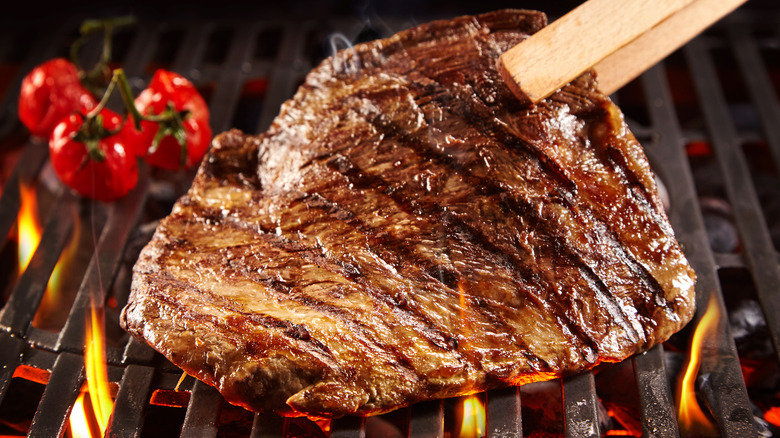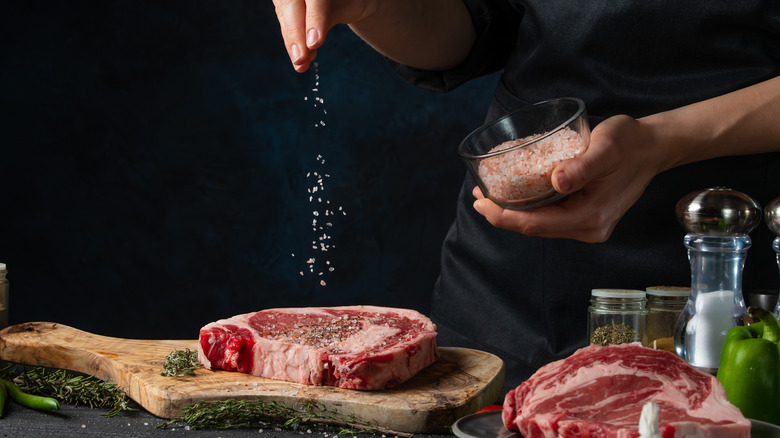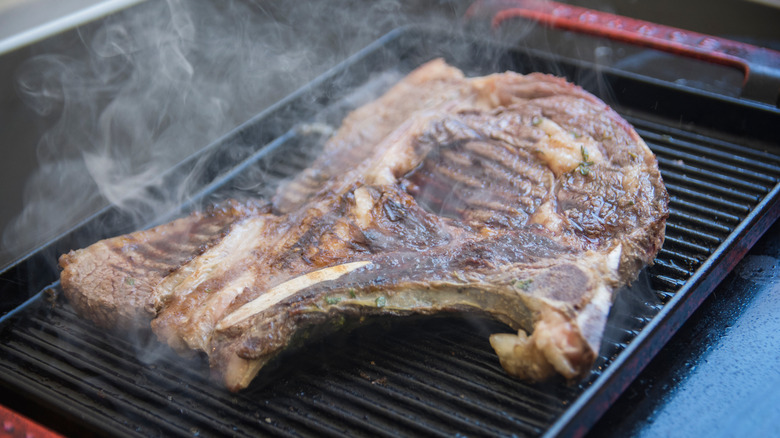Why You Should Always Sear Before Grilling Your Steak
Everyone wants to grill the perfect steak. They want it to be crispy on the outside, juicy on the inside, and overall just an enjoyable experience. However, there is a lot about steak preparation that gets glossed over, which can lead to less-than-perfect outcomes. Basic steak grilling mistakes like under-seasoning, cooking your steak cold, and neglecting to clean the grill can all have significant adverse effects on the results. However, let us assume for the moment that you have done your homework and are adequately prepared to get grilling. There is still one more step you need to take to perfect your meal: searing.
Think of searing as insurance. Even if you've missed another step or are less than confident about your steak grilling ability, getting the sear right will help everything else fall into place. To sear your steak, you're going to need three main "ingredients": heat, salt, and patience. And in terms of heat, we're not talking about a low simmer or medium boil. We're talking screaming hot. This level of heat, combined with salt and time, will ensure you achieve the thing that makes the sear so important, the ultimate goal behind it all: the crust.
Getting to that perfect crust
Getting the sear right begins with proper preparation, and that means salt. Now, you really shouldn't be too afraid of over-seasoning. Trust us, it is really, really hard to over-salt a steak. Besides, any excess seasoning is going to drop in between the grill grates and disappear into the flames anyway. As Christian Ragano, executive chef at Cindy's restaurant in Chicago, told Food & Wine, having more flavor as opposed to less is always the right way to go.
Salting your steak liberally before throwing it on the grill is important, but so too is the time you allow the salt to sink in. Legendary chef J. Kenji López-Alt recommends no less than 40 minutes of seasoning and sitting, as he writes in Serious Eats. Salt draws out the moisture from the steak, so allowing the steak this time means the moisture can be released from the meat to dissolve the salt, then be absorbed back into the meat. This way you're not getting pockets of heavy, almost burnt crisps of salt that stick to the grill or the pan — instead, the crust-in-progress sticks to the steak and the salt helps with caramelization, per Delish.
By the time you get to the grill, you'll have a steak that is well-seasoned and ready to go. However, now that you've reached this point in the process, there is a common misconception about searing that we'd like to dispel right away.
Does searing actually lock in moisture?
You might have heard that searing locks in moisture. This is a pervasive myth throughout the food world, so we're here to tell you that searing is not some sort of magical moisture seal for your steak. In fact, it functions in the opposite way. According to Exploratorium, the proteins in the steak constrict during searing and actually expel more water. You know that trademark sizzle you hear when the steak hits the grill? That's the sound of water reacting to the heat and turning into steam. But if the sear doesn't seal in those coveted juices, why bother?
Remember our friend the crust? Well, the crust is a result of what's known as the Maillard reaction, a chemical process that occurs between sugars and amino acids, the building blocks of all proteins — and arises from loss of moisture, not retention, The Kitchn reminds us. The Maillard reaction helps achieve that crust by browning the meat, thereby creating an extra layer of flavor that didn't exist prior to searing. This process works best at high temperatures, which is why you want a swift and scorching sear, explains ThermoWorks.
Since searing is great for flavor but doesn't prevent the escape of moisture, Martha Stewart advises that resting your steak for a while (ideally half the length of the cooking time) once it's off the grill will allow any escaped juices to retract back into the steak. So in conclusion, for your perfect steak, sear for the crisp, rest for the juices, and you're home clear.


